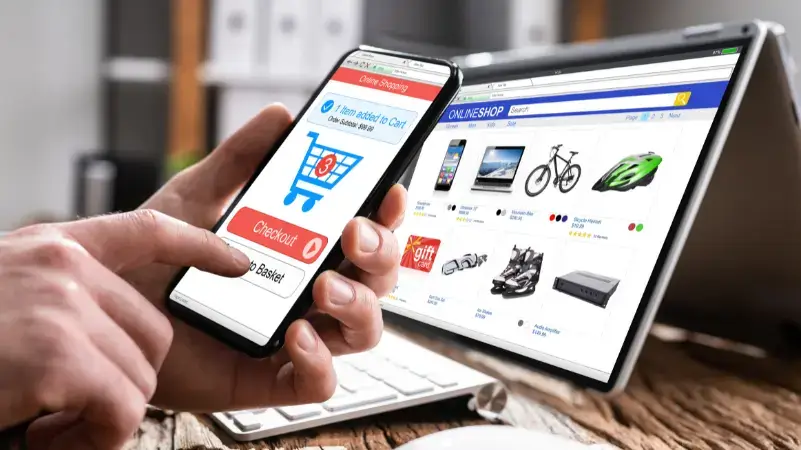Website and mobile apps are two distinct types of applications that serve different purposes. While you can access website apps through a web browser, mobile apps are downloaded and installed onto a mobile device; both have their strengths and weaknesses.
Let's explore the best use cases for website apps and why they may be the better choice in certain situations, with a specific focus on ecommerce.
Article Shortcuts:
- What is a Website App?
- Website Apps: Best Use Cases for eCommerce
- No-Code Website Apps: The Rise of User-Friendly Platforms
- When Not to Use a Website App
{% module_block module "widget_1681943931046" %}{% module_attribute "child_css" is_json="true" %}{% raw %}{}{% endraw %}{% end_module_attribute %}{% module_attribute "css" is_json="true" %}{% raw %}{}{% endraw %}{% end_module_attribute %}{% module_attribute "definition_id" is_json="true" %}{% raw %}null{% endraw %}{% end_module_attribute %}{% module_attribute "field_types" is_json="true" %}{% raw %}{"default_text":"group","slides":"group","slideshow_settings":"group","styles":"group"}{% endraw %}{% end_module_attribute %}{% module_attribute "label" is_json="true" %}{% raw %}"Image Slider"{% endraw %}{% end_module_attribute %}{% module_attribute "module_id" is_json="true" %}{% raw %}98459521332{% endraw %}{% end_module_attribute %}{% module_attribute "path" is_json="true" %}{% raw %}"@hubspot/image_slider_gallery"{% endraw %}{% end_module_attribute %}{% module_attribute "schema_version" is_json="true" %}{% raw %}2{% endraw %}{% end_module_attribute %}{% module_attribute "slides" is_json="true" %}{% raw %}[{"caption":"Embed a form builder app on your website to collect valuable customer data or to take new orders.","img":{"alt":"powr-form-builder-website-app","height":500,"loading":"disabled","size_type":null,"src":"https://5950818.fs1.hubspotusercontent-na1.net/hubfs/5950818/powr-form-builder-website-app-1.webp","width":1000},"link_url":{"no_follow":false,"open_in_new_tab":true,"rel":"noopener","sponsored":false,"url":{"content_id":null,"href":"https://www.powr.io/form-builder-website-app","href_with_scheme":"https://www.powr.io/form-builder-website-app","type":"EXTERNAL"},"user_generated_content":false}},{"caption":"Install a popup website app to advertise upcoming sales, offer discounts, or for new product releases.","img":{"alt":"powr-popup-website-app","height":500,"loading":"disabled","size_type":null,"src":"https://5950818.fs1.hubspotusercontent-na1.net/hubfs/5950818/powr-popup-website-app-1.webp","width":1000},"link_url":{"no_follow":false,"open_in_new_tab":true,"rel":"noopener","sponsored":false,"url":{"content_id":null,"href":"https://www.powr.io/popup-website-app","href_with_scheme":"https://www.powr.io/popup-website-app","type":"EXTERNAL"},"user_generated_content":false}},{"caption":"Use a video gallery to show product demos, how-to tutorials, or a tour of your company facility.","img":{"alt":"powr-video-gallery-website-app","height":500,"loading":"disabled","size_type":null,"src":"https://5950818.fs1.hubspotusercontent-na1.net/hubfs/5950818/powr-video-galery-website-app.webp","width":1000},"link_url":{"no_follow":false,"open_in_new_tab":true,"rel":"noopener","sponsored":false,"url":{"content_id":null,"href":"https://www.powr.io/video-gallery-website-app","href_with_scheme":"https://www.powr.io/video-gallery-website-app","type":"EXTERNAL"},"user_generated_content":false}}]{% endraw %}{% end_module_attribute %}{% module_attribute "smart_objects" is_json="true" %}{% raw %}[]{% endraw %}{% end_module_attribute %}{% module_attribute "smart_type" is_json="true" %}{% raw %}"NOT_SMART"{% endraw %}{% end_module_attribute %}{% module_attribute "styles" is_json="true" %}{% raw %}{"slide":{"caption":{"text":{"font":{"size":16,"styles":null,"fallback":null,"size_unit":null,"css":"font-size: 16px;","color":null,"variant":null,"font":null,"style":null,"font_set":"DEFAULT"}}}}}{% endraw %}{% end_module_attribute %}{% module_attribute "tag" is_json="true" %}{% raw %}"module"{% endraw %}{% end_module_attribute %}{% module_attribute "type" is_json="true" %}{% raw %}"module"{% endraw %}{% end_module_attribute %}{% module_attribute "wrap_field_tag" is_json="true" %}{% raw %}"div"{% endraw %}{% end_module_attribute %}{% end_module_block %}
What is a Website App?
Website apps are ideal for businesses that want to reach a wider audience or individuals who prefer accessing an app through a web browser.
They are typically built using web technologies like HTML, CSS, and JavaScript and are designed to work across multiple devices and platforms.
However, there is a lot of momentum from no-code website apps and plugin providers, like POWR, making huge waves in the small business community.
Small business owners, often short on web development and coding knowledge, find no-code website apps simple to create and install on their websites for very little cost, with no outside help from expensive tech-savvy engineers. It's a perfect match for anyone who wants to improve their website on a budget.
Website Apps: Best Use Cases for eCommerce
Website apps are ideal for ecommerce businesses that want to reach a wider audience and provide an accessible and convenient way for customers to browse and shop for products.
One of the key benefits of website apps is that you can easily access them from any device with an internet connection and a web browser without downloading and installing anything on the user's device.
It's a proven method to improve organic traffic to your online store. If you want to improve website traffic for your ecommerce business, website apps will do the trick.

It can benefit customers who are hesitant to download apps or need more storage space.
Ecommerce businesses can benefit from website apps by providing a seamless shopping experience for customers. They can offer product catalogs, online shopping carts, and checkout processes that are easy to use and accessible from any device.
Additionally, you can design website apps to be responsive, meaning that they can adapt to different screen sizes and resolutions, ensuring a consistent and optimized user experience.
Another benefit of website apps for ecommerce businesses is that they can be easily updated and maintained.
Changes can be made to the website app in real-time, allowing companies to respond quickly to customer needs and market trends. It can include updating product information, pricing, or shipping options.
Furthermore, website apps can be integrated with other third-party tools and services, such as secure payment gateways or shipping providers, to provide customers with a seamless and secure shopping experience.
No-Code Website Apps: The Rise of User-Friendly Platforms
In recent years, the rise of no-code website app platforms has made it easier for individuals and businesses to create their own website apps without coding knowledge.

No-code platforms like Wix, Squarespace, and Bubble offer drag-and-drop interfaces and pre-built templates allowing users to quickly and easily create functional and professional-looking website apps quickly and easily.
"Low-code and no-code platforms have unlocked the power of software development to anyone with an idea and dramatically lowered the barrier to entry for startups and entrepreneurs," said Eric Siu, CEO of ClickFlow and Single Grain, in an interview with Forbes. "They are empowering a new generation of tech-enabled business leaders to bring their ideas to market faster and more flexible."
One of the critical benefits of no-code website apps is their accessibility. Individuals and small businesses needing more resources or expertise to hire a professional developer can create their own website apps with minimal investment.
It has opened up new opportunities for entrepreneurs and small businesses to create an online presence and reach their target audience.
When Not to Use a Website App
While website apps are a useful tool for businesses and individuals to reach their target audience, there are situations when there may be better choices.
One of the key limitations of website apps is that they may need help accessing certain device hardware features, such as a camera or GPS, which can limit their usefulness for certain types of applications.
Another limitation of website apps is that they may not be able to provide a seamless and optimized user experience for certain types of applications.
For example, website apps may not be suitable for applications that require advanced interactivity or animations, such as gaming or animation tools. In such cases, businesses may need to consider partnering with a mobile app developer company to create a native mobile app that can offer more advanced features and functionality.
Furthermore, website apps may not be suitable for applications requiring offline access or complex data requirements. While website apps can be designed to work offline to a certain extent, they may need to provide a different level of functionality than a mobile app.
Conclusion
In conclusion, website and mobile apps have unique strengths and weaknesses. Website apps are accessible from any device with an internet connection and a web browser, making them ideal for ecommerce businesses that want to provide an accessible and convenient way for customers to browse and shop for products.
While they may not be able to access specific hardware features of a device, website apps can be easily updated and maintained. They can be integrated with other third-party tools and services to provide customers with a seamless and secure shopping experience.
Ultimately, the decision to use a website or a mobile app depends on the intended audience, the goals of the application, and the available resources.
Author Bio
Mick Essex is the Growth Marketing Manager at POWR. His career spans two decades, primarily in the healthcare industry, with stints in broadcast television advertising and copy editing. Mick attended the College of Journalism at the University of Louisiana - Monroe. He and his family currently call Lafayette, Louisiana home. Follow him on LinkedIn



